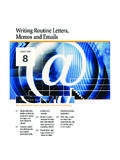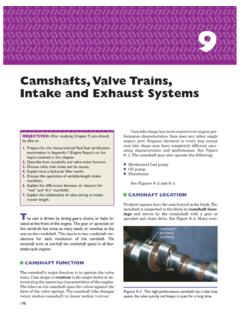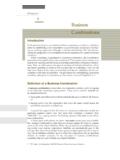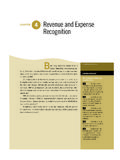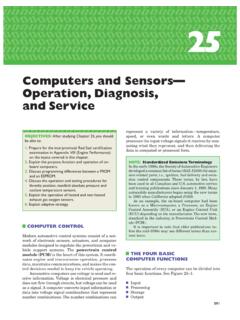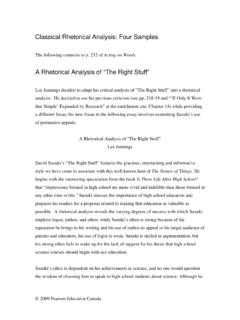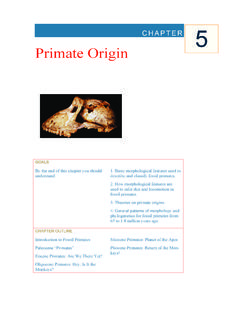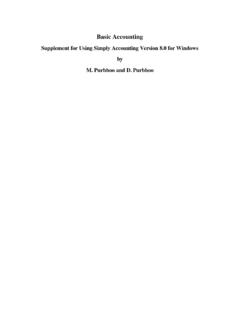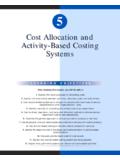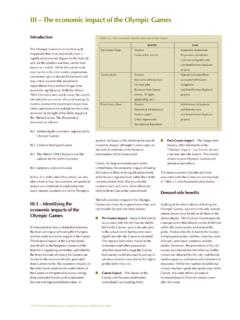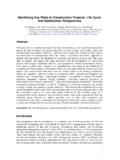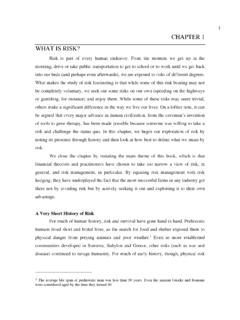Transcription of 2 Decision Making Economic - Pearson
1 Ood fortune has come your way. After several weeks of interviewing,you have received job offers from three firms. The offers differ greatly,which leaves you quite confused. You have made this list of the national firm, $12 per hour starting wage, life insurance anddental benefits paid by the company, a two-week paid vacationeach year, and potential for rapid local firm, $20 per hour starting wage, life insurance anddental benefits available but you must pay the premiums, a two-week paid vacation each year, share options and pension planbenefits, and potential for firm, $15 per hour starting wage, full life insurance anddental benefits, one-week paid vacation, good pension plan, andmoderate advancement you consider the short run or the long run for this Decision ?
2 Whichoffer provides you with the most today and which one the most overthe next five years? What is the real Economic value of the benefits?Aside from the monetary considerations, do you like the work you willperform in each position and the people with whom you will work?How do you organize your thoughts to make this Decision ?Regardless of the form of organization or the business activity,success in the world of business sometimes even survival dependson Making wise Economic decisions. A key ingredient is an under-standing of the Decision - Making process itself. Because economicdecision Making relies heavily on accounting information, it is crucialfor that information to be useful to Economic Decision Decision Making2 Life is a never-ending sequence of decisions, some very complexand others relatively simple.
3 Because we cannot know the future, westrive to reduce uncertainty in any Decision by collecting as muchinformation as possible. We designed this chapter to help you learn alogical Decision - Making process. WHATISDECISIONMAKING? Decision makingis the process of identifying alternative courses of action and select-ing an appropriate alternative in a given Decision situation. This definition pre-sents two important alternative courses of actionmeans that an ideal solution may notexist or might not be an appropriate alternative implies that there may be a number ofappropriate alternatives and that inappropriate alternatives are to beevaluated and rejected. Thus, judgment is fundamental to Decision is implicit in our definition of Decision Making .
4 We may not like the alter-natives available to us, but we are seldom left without and Sacrifices: The Trade-offIn general, the aim of all decisions is to obtain some type of reward, either eco-nomic or personal. Reward requires sacrifice. When you made the Decision toattend college or university, for example, you certainly desired a reward. What wasthe sacrifice?Chapter 2 Economic Decision Making33 LEARNINGOBJECTIVESA fter completing your work on this chapter, you should be able to do the concepts of extrinsic and intrinsic rewards, sacrifices, andopportunity costs as they pertain to Decision the two types of Economic Decision makers and explain the basicdifferences between management accounting and financial the three questions all Economic Decision makers attempt toanswer and explain why these questions are so the importance of cash as a measure of business success or accounting information and distinguish it from accounting the qualitative characteristics of useful accountinginformation and apply them in Decision - Making the difference between reality and the measurement of the criteria for revenue and expense recognition under the cashbasis of accounting to determine periodic net the criteria for revenue and expense
5 Recognition under theaccrual basis of accounting to determine periodic net of some things you cannot do because you are attending college. Somesacrifices cannot be measured in dollars (such as loss of sleep, lack of home-cookedmeals, and loss of leisure time). Some, however, can be measured. Suppose thatinstead of attending college you could work full time and earn $15,000 a college, therefore, costs you that $15,000, in addition to what you pay fortuition and books. We call the $15,000 an opportunity cost of Making the Decision toattend college. An opportunity costis the reward we forego because we choose aparticular alternative instead of another. Most decisions include opportunity makers want the reward or benefit from a Decision to be greater thanthe sacrifice or cost required to attain it (see Exhibit 2 1).
6 Examining the relation-ship between rewards and sacrifices is known as cost/benefit a condi-tion of absolute certainty, in which the outcome of a Decision is known withoutdoubt, cost/benefit analysis provides a certain outcome. Unfortunately, absolutecertainty rarely, if ever, examples that accountants use to describe the trade-off between rewardsand sacrifices, money is usually the reward. Money is an extrinsic reward,meaningthat it comes from outside ourselves and is a tangible object we can acquire. Anintrinsic rewardis one that comes from inside ourselves. When you accomplish adifficult task, the intrinsic reward comes from the sense of satisfaction you feel. Anold adage says, The best things in life are free.
7 Not so! Anything worth havingrequires 2 Economic Decision MakingDiscussion Questions2 reward or rewards do you hope to obtain by attending collegeor university?2 sacrifices are you personally Making to attend college oruniversity ?opportunity costThebenefit or benefits forgone by not selecting a particularalternative. Once an alternativeis selected in a decisionsituation, the benefits of allrejected alternatives becomepart of the opportunity cost ofthe alternative analysisDeals with the trade-offbetween the rewards ofselecting a given alternativeand the sacrifices required to obtain those 2 1 Cost versus BenefitCostBenefitDiscussion Questions2 is the one thing you desire most from life?
8 What sacrificesmust you make to obtain it?2 sacrifice does a business owner make when purchasingmachinery for the production plant?2 benefit does the owner derive from the sacrifice to purchasethe machinery?ECONOMICDECISIONMAKINGE conomic Decision Making ,in this book, refers to the process of Making business deci-sions involving money. All Economic decisions of any consequence require the useof some sort of accounting information, often in the form of financial using accounting information to make Economic decisions must under-stand the business and Economic environment in which accounting information isgenerated, and they must also be willing to devote the necessary time and energyto make sense of the accounting Decision makers are either internal or external.
9 Internal decisionmakersare individuals within a company who make decisions on behalf of thecompany, while external Decision makersare individuals or organizations outsidea company who make decisions that affect the company. Exhibit 2-2 illustratessome decisions made by internal and external Decision Decision MakersInternal Decision makers decide whether the company should sell a particularproduct, whether it should enter a certain market, and whether it should hire orfire employees. Note that in all these matters, the responsible internal decisionmaker makes the Decision not for himself or herself, but rather for the on their position within the company, internal Decision makersmay have access to much, or even all, of the company s financial information.
10 Theydo not have complete information, however, because all decisions relate to thefuture and always involve Decision MakersExternal Decision makers make decisions abouta company. External Decision mak-ers decide whether to invest in the company, whether to sell to or buy from thecompany, and whether to lend money to the 2 Economic Decision Making35internal Decision makersEconomic Decision makerswithin a company who makedecisions for the company. Theyhave access to much or all ofthe accounting informationgenerated within the Decision makersEconomic Decision makersoutside a company who makedecisions about the accounting informationthey use to make thosedecisions is limited to what thecompany provides to CampaignsAccountingFinancial InformationProductionWhat to ProducePersonnelWho to HireINTERNALDECISION MAKERSLoanInvoiceSharesPurchaseOrderBank ersCustomersInvestorsVendorsEXTERNALDECI SION MAKERSMakeDecisionsAbouta FirmExhibit 2 2 External vs.
